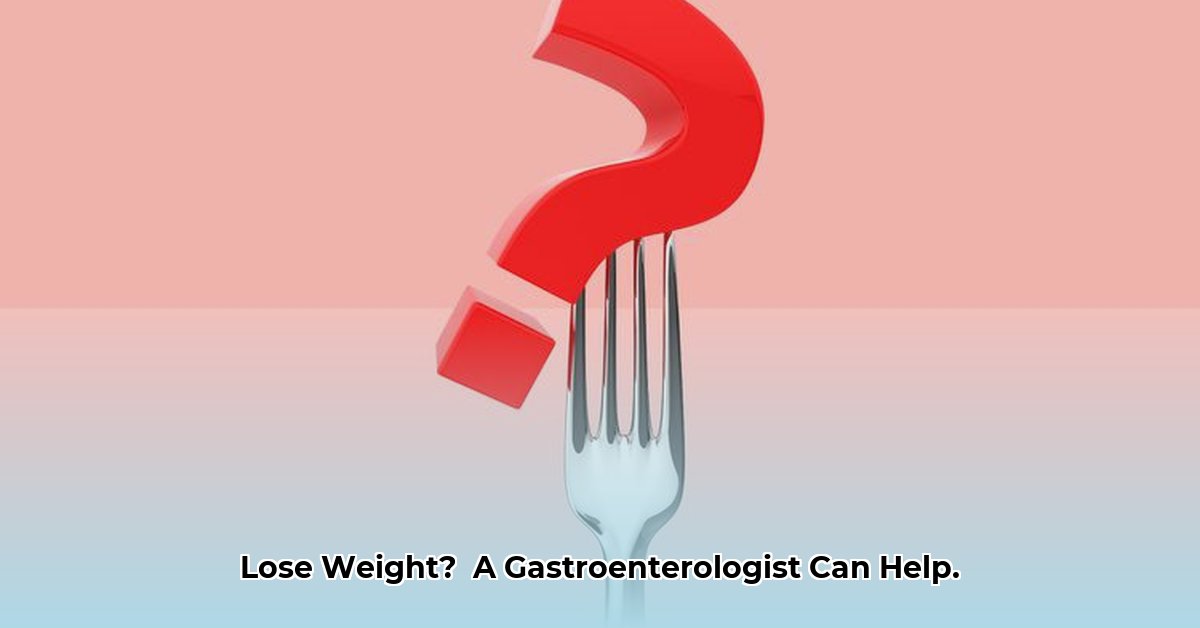
Understanding the Gut-Weight Connection
Ever wonder if your gut health impacts your weight? The answer is a resounding yes. Your digestive system, home to trillions of bacteria (your gut microbiome), plays a significant role in how your body processes food, absorbs nutrients, and even regulates hormones. An imbalance in this microbiome (dysbiosis) can contribute to weight gain and make weight loss challenging. Conditions like irritable bowel syndrome (IBS), inflammatory bowel disease (IBD), and gastroparesis (delayed stomach emptying) can further complicate weight management by affecting appetite, nutrient absorption, and energy levels.
Does this mean a gastroenterologist is your ticket to effortless weight loss? Not exactly. However, they can be invaluable allies by addressing underlying digestive issues hindering your progress. Let's explore how.
The Gastroenterologist's Role in Weight Management
A gastroenterologist focuses on diagnosing and treating digestive problems that may be sabotaging your weight-loss efforts. Their expertise offers a multifaceted approach:
1. Diagnosing and Treating Digestive Disorders: A gastroenterologist acts as a detective, identifying and treating conditions like IBS, IBD, celiac disease, or other digestive issues interfering with your weight. Managing these conditions can significantly improve energy levels, regulate appetite, and optimize nutrient absorption.
2. Identifying Food Sensitivities and Intolerances: Undiagnosed food sensitivities and intolerances can trigger inflammation, disrupt digestion, and impair nutrient absorption, all contributing to weight gain. A gastroenterologist can conduct tests to pinpoint these hidden culprits, allowing for targeted dietary adjustments.
3. Analyzing the Gut Microbiome: The gut microbiome is a frontier in weight management research. Some gastroenterologists offer microbiome analysis to determine bacterial balance and tailor dietary recommendations accordingly. This personalized approach can optimize gut health and thus influence weight.
4. Medication Review: Certain medications can affect gut health and weight. A gastroenterologist can review your medications, identify any potential conflicts, and suggest alternatives or adjustments to support both your digestive and weight-loss goals.
5. Holistic Lifestyle Recommendations: Beyond diagnosis and treatment, gastroenterologists provide valuable lifestyle advice. This includes creating sustainable eating plans, incorporating stress management techniques, and promoting regular physical activity to complement medical interventions.
Beyond Digestive Disorders: Can a Gastroenterologist Still Help?
Even without diagnosed digestive problems, a gastroenterologist's consultation can be beneficial. They can identify subtle issues, optimize digestive function and overall health, and consequently positively impact weight management.
Navigating Your Appointment: A Collaborative Journey
Your initial appointment will involve a detailed discussion of your medical history, including symptoms, dietary habits, lifestyle, and medications. A physical examination will follow. Depending on your needs, your gastroenterologist might recommend blood tests or imaging studies. This comprehensive assessment informs personalized recommendations, including dietary changes or further testing.
Key Takeaways:
- A gastroenterologist's role in weight loss centers on addressing underlying digestive issues, not offering a quick fix. It's a collaborative journey requiring open communication.
- Improved digestive health, often facilitated by a gastroenterologist, directly influences energy levels, appetite regulation, and nutrient absorption – all vital for weight management.
- Addressing food sensitivities, optimizing the gut microbiome, and reviewing medications are key strategies employed by gastroenterologists in a holistic weight management approach.
Actionable Steps:
- Schedule a consultation: Discuss your weight-loss goals and digestive health with a gastroenterologist.
- Be transparent: Share your complete medical history, including symptoms, lifestyle, and medications.
- Follow recommendations: Adhere to your gastroenterologist's dietary and lifestyle advice.
- Maintain open communication: Regularly update your gastroenterologist on your progress and any concerns.
- Embrace a holistic approach: Combine medical guidance with healthy habits for long-term success.